中考英语复习- 简单句(基础讲解)
- 格式:doc
- 大小:51.00 KB
- 文档页数:5
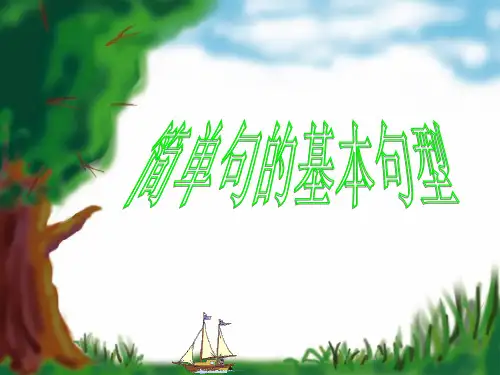


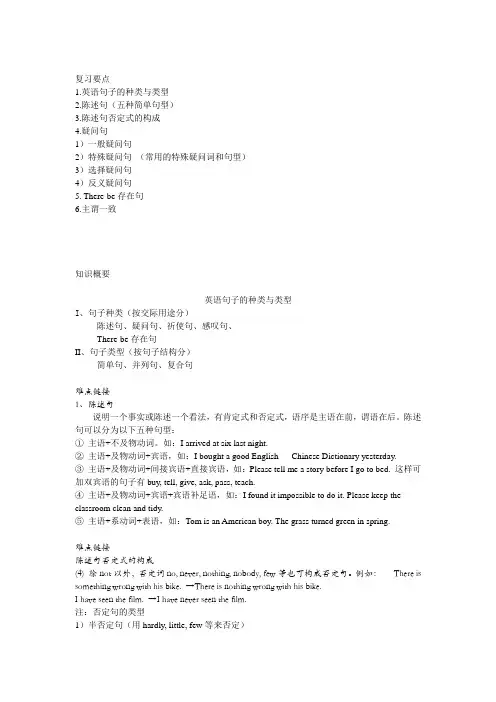
复习要点1.英语句子的种类与类型2.陈述句(五种简单句型)3.陈述句否定式的构成4.疑问句1)一般疑问句2)特殊疑问句(常用的特殊疑问词和句型)3)选择疑问句4)反义疑问句5. There-be存在句6.主谓一致知识概要英语句子的种类与类型I、句子种类(按交际用途分)陈述句、疑问句、祈使句、感叹句、There-be存在句II、句子类型(按句子结构分)简单句、并列句、复合句难点链接1、陈述句说明一个事实或陈述一个看法,有肯定式和否定式,语序是主语在前,谓语在后。
陈述句可以分为以下五种句型:①主语+不及物动词。
如:I arrived at six last night.②主语+及物动词+宾语,如:I bought a good English Chinese Dictionary yesterday.③主语+及物动词+间接宾语+直接宾语,如:Please tell me a story before I go to bed. 这样可加双宾语的句子有buy, tell, give, ask, pass, teach.④主语+及物动词+宾语+宾语补足语,如:I found it impossible to do it. Please keep the classroom clean and tidy.⑤主语+系动词+表语,如:Tom is an American boy. The grass turned green in spring.难点链接陈述句否定式的构成(4) 除not以外,否定词no, never, nothing, nobody, few等也可构成否定句。
例如:There is something wrong with his bike. →There is nothing wrong with his bike.I have seen the film. →I have never seen the film.注:否定句的类型1)半否定句(用hardly, little, few等来否定)I hardly know anything about it.2)部分否定句(用all, both, every, each+谓语+not否定,表示“有的是,有的不是”)I don’t like both the films.3)全否定句(用not, no, never, neither, nor, nothing等来否定)I like neither Cathy nor Mary.4)否定转移(用在含有think, believe, expect, suppose, imagine为主句的句子)I don’t think it will be very cold today幻灯片6难点链接陈述句否定式的构成(1) 如果肯定陈述句的谓语部分含有助动词、情态动词或连系动词be,则只需在这些动词后加not即可构成否定式。
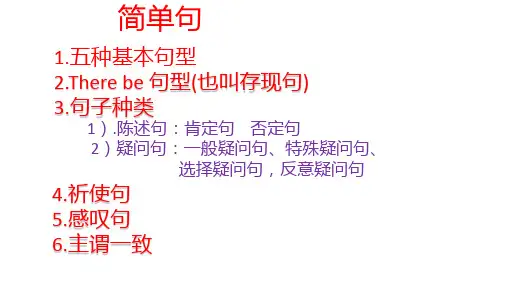
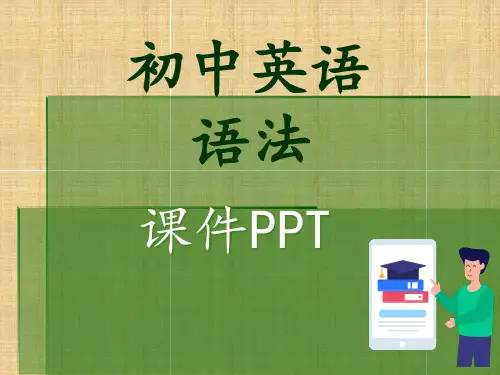
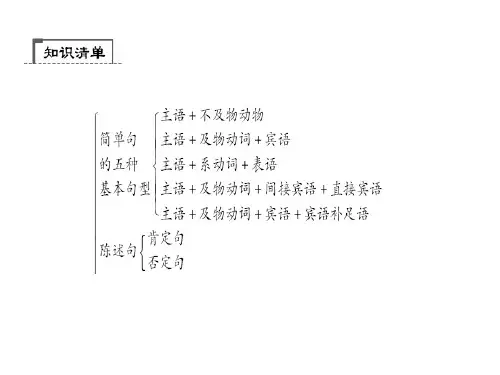
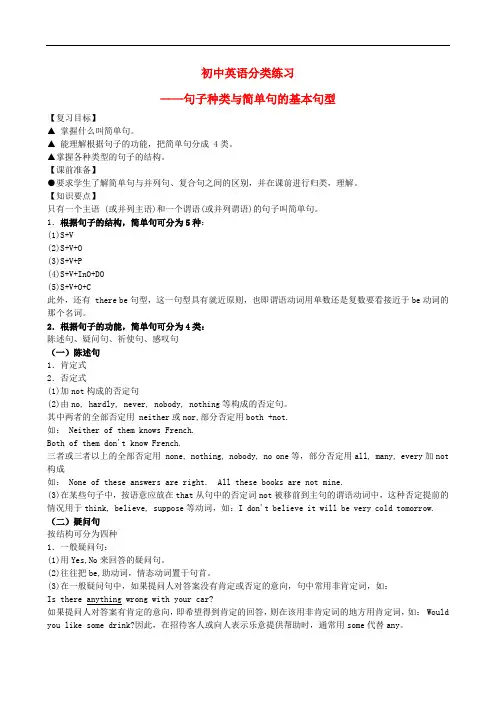
初中英语分类练习——句子种类与简单句的基本句型【复习目标】▲ 掌握什么叫简单句。
▲ 能理解根据句子的功能,把简单句分成 4类。
▲掌握各种类型的句子的结构。
【课前准备】●要求学生了解简单句与并列句、复合句之间的区别,并在课前进行归类,理解。
【知识要点】只有一个主语 (或并列主语)和一个谓语(或并列谓语)的句子叫简单句。
1.根据句子的结构,简单句可分为5种:(1)S+V(2)S+V+O(3)S+V+P(4)S+V+InO+DO(5)S+V+O+C此外,还有 there be句型,这一句型具有就近原则,也即谓语动词用单数还是复数要看接近于be动词的那个名词。
2.根据句子的功能,简单句可分为4类:陈述句、疑问句、祈使句、感叹句(一)陈述句1.肯定式2.否定式(1)加not构成的否定句(2)由no, hardly, never, nobody, nothing等构成的否定句。
其中两者的全部否定用 neither或nor,部分否定用both +not.如: Neither of them knows French.Both of them don't know French.三者或三者以上的全部否定用 none, nothing, nobody, no one等,部分否定用all, many, every加not构成如: None of these answers are right.All these books are not mine.(3)在某些句子中,按语意应放在that从句中的否定词not被移前到主句的谓语动词中,这种否定提前的情况用于think, believe, suppose等动词,如:I don't believe it will be very cold tomorrow.(二)疑问句按结构可分为四种1.一般疑问句:(1)用Yes,No来回答的疑问句。
(2)往往把be,助动词,情态动词置于句首。
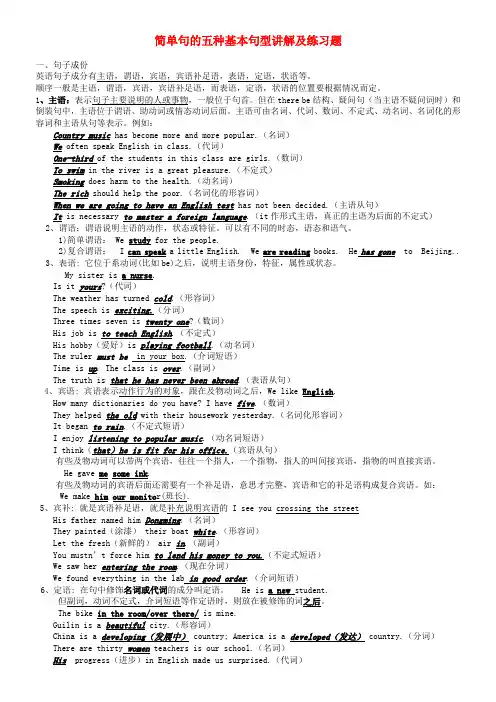
简单句的五种基本句型讲解及练习题一、句子成份英语句子成分有主语,谓语,宾语,宾语补足语,表语,定语,状语等。
顺序一般是主语,谓语,宾语,宾语补足语,而表语,定语,状语的位置要根据情况而定。
1、主语:表示句子主要说明的人或事物,一般位于句首。
但在there be结构、疑问句(当主语不疑问词时)和倒装句中,主语位于谓语、助动词或情态动词后面。
主语可由名词、代词、数词、不定式、动名词、名词化的形容词和主语从句等表示。
例如:Country music has become more and more popular.(名词)We often speak English in class.(代词)One-third of the students in this class are girls.(数词)To swim in the river is a great pleasure.(不定式)Smoking does harm to the health.(动名词)The rich should help the poor.(名词化的形容词)When we are going to have an English test has not been decided.(主语从句)It is necessary to master a foreign language.(it作形式主语,真正的主语为后面的不定式)2、谓语:谓语说明主语的动作,状态或特征。
可以有不同的时态,语态和语气。
1)简单谓语: We study for the people.2)复合谓语: I can speak a little English. We are reading books. He has gone to Beijing..3、表语: 它位于系动词(比如be)之后,说明主语身份,特征,属性或状态。
My sister is a nurse.Is it yours?(代词)The weather has turned cold.(形容词)The speech is exciting.(分词)Three times seven is twenty one?(数词)His job is to teach English.(不定式)His hobby(爱好)is playing football.(动名词)The ruler must be in your box.(介词短语)Time is up. The class is over.(副词)The truth is that he has never been abroad.(表语从句)4、宾语: 宾语表示动作行为的对象,跟在及物动词之后,We like English.How many dictionaries do you have? I have five.(数词)They helped the old with their housework yesterday.(名词化形容词)It began to rain.(不定式短语)I enjoy listening to popular music.(动名词短语)I think(that)he is fit for his office.(宾语从句)有些及物动词可以带两个宾语,往往一个指人,一个指物,指人的叫间接宾语,指物的叫直接宾语。
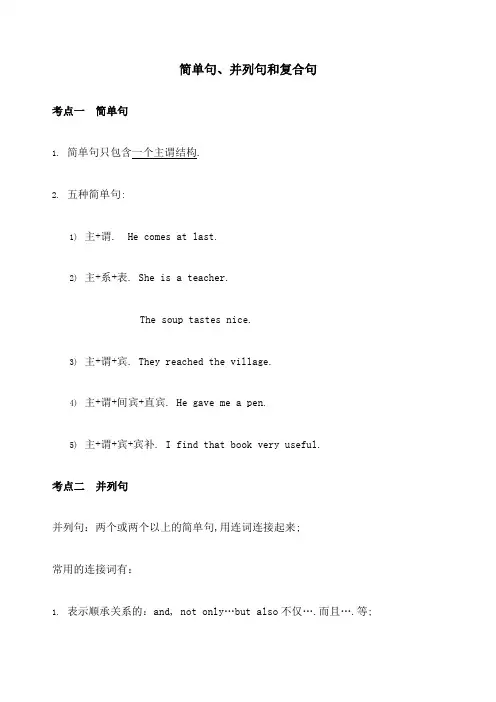
简单句、并列句和复合句考点一简单句1.简单句只包含一个主谓结构.2.五种简单句:1)主+谓. He comes at last.2)主+系+表. She is a teacher.The soup tastes nice.3)主+谓+宾. They reached the village.4)主+谓+间宾+直宾. He gave me a pen.5)主+谓+宾+宾补. I find that book very useful.考点二并列句并列句:两个或两个以上的简单句,用连词连接起来;常用的连接词有:1.表示顺承关系的:and, not only…but also不仅….而且….等;She ______ gave us a lot of advice, _______ helped us to overcome difficulties.Linda tried to become an excellent teacher, _____ at last she succeeded.2.表示选择关系和否定条件的有or还是,否则Do you want to leave now ____ would you rather set off laterWear your coat, ____ you’ll catch a cold.3.表示转折关系的有but, yet等;He is young, but he works hard.虽然他年轻,但工作努力;4.表示因果关系的有for, so 等;My leg hurts so I go to see a doctor. 我的腿疼,因此我去看医生;考点三主从复合句:宾语从句1.宾语从句的引导词1引导陈述句用 that在口语和非正式文体中常常省略He tells me that he is going shopping this Sunday.2 引导一般疑问句用if或whether.She asked me if\ whether she could join us. whether…or not3 引导特殊疑问句,要用原来的特殊疑问词;She asked them what they were doing.2.宾语从句的语序:要用陈述句语序;I want to know when the train left.3. 宾语从句的时态1主句是一般现在时,一般将来时或祈使句,宾语从句可根据实际需要选用各种时态;He tells us that he has been able to look after himself.(2)主句是过去时态,宾语从句应使用过去时的相应时态;They said that they had already finished the work.(3)如果宾语从句叙述的是客观事实、真理、自然现象等,不管主句用什么时态,从句都用一般现在时;He said that light travels faster than sound.3. 练习1She asked me, “Will you go to the cinema tomorrow”改为含宾语从句的复合句She asked me______ I ______ go to the cinema the next day.2 How lovely the dog is Can you tell me _____A. where did you get itB. where will you get itC. where you got it3 --- Can you tell me _____ your parents at home--- I often wash clothes and sweep the floor.A.how will you helpB. how you helpC. how will you helpD. howdo you help4 When I was young, my grandfather told me that the sun ______ rise in the east.考点四状语从句一、状语从句在复合句中作状语,修饰主句中的动词、形容词、副词等;1.地点状语从句地点状语从句通常由 where 引导;Put all the things _____they were.A. whereB. whenC. whoseD. which2.时间状语从句主句用将来时,从句用一般现在时时间状语从句的引导词有when, before, after, until, as soon as, since, while, as 等She was cooking when someone knock at the door.What will you do after you finished your homework3.条件状语从句在条件状语从句中,常用的引导词有if, unless等;If it dosen’t rain, I” ll go fishing.They will have a picnic unless it rains next Sunday.4.原因状语从句原因状语从句常用的引导词有because, as, since既然等He didn’t come because he was ill.Since we are students, we should study hard.Because 和so 不能在一个句子中同时使用;5. 结果状语从句结果状语从句主要由so…that…, such…that…引导;It’s so hot that we want to go swimming.That’s such an interesting story that everybody likes it.So… that…与简单句之间的句型转换1)that后的句子是否定句,常用too…to进行转换;He is so young that he can’t go to school. he is too young to go to school.2)that后的句子是肯定句;常用enough to 进行转换;The shirt was so cheap that he bought it. the shirt was cheap enough for him to buy.6.目的状语从句目的状语从句常用的引导词有so that, in order that 等 in order to 简单句Please say it in a loud voice so that everyone can hear it.He works harder in order that he can go to a good college.7. 让步状语从句引导词有though, although, even if, even though尽管等;He often helps others though\ although he is not rich.They will stand by you even if you don’t succeed.Though, although与but 不能同时出现在一个句子中8.比较状语从句比较状语从句由than, as…as…, not as\so… as等引导;比较级He is more outgoing than I.He ran as fast as Mike.二、练习1. It’s quite common in Britain to say “thank you”to the drivers _____ people get off the bus.a. afterb. sincec. untild. when2. The art club is for members only. You can’t go in ____you are a member.a. unlessb. becausec. ifd. though3. Now many parents send their children to foreign countries, _____ they want them to get a better education.a. untilb. thoughc. because4. ---- What would some students like to do after finishing their education---- They would like to start to work_______ they needn’t depend on their parents completely.a. as soon asb. so thatc. befored. while考点五定语从句修饰某一名词或代词的从句叫定语从句;被定语从句修饰的词叫先行词,引导定语从句的词叫关系词关系代词和关系副词;1.关系代词的基本用法The man __________spoke at the meeting is from Hong Kong. 指人作主语The building ___________is being built will be used as a hospital.指物作主语I visited a scientist _______ name is known all over the world. 指人作定语2. 关系代词特殊用法1当关系代词在从句中作主语时,从句的谓语动词要与先行词保持一致;He is one of the boys who ______ like playing football.He is the only one of the boys who________ like playing football.2 通常以下四种情况关系代词只能用that而不能用which.1 先行词为all, much, something, everything, nothing, little, none, the one 等不定代词时2先行词被形容词最高级修饰时;3当先行词被the only, the very, the just等修饰时;4先行词中既有人又有物时;3. 关系副词的基本用法;1 when 在句中作状语,表示时间;2 where 在句中作状语,表示地点;.3 why 在句中作状语,表示原因;He remembers the day _______ he joined the League.This is the reason_______ he is late today.This is the place _______ Lu Xun was born.1. 2011泰安--- _______do you read English newspapers---I read China Daily every day.A. How longB. How soonC. How oftenD. How far2.2011抚州John had a short walk after lunch, _______A. did heB. didn't heC. had heD. hadn't he3.2011宁波--- _______do you have an Art Festival in your school---Once a year.A. How longB. How oftenC. How farD. How soon4.2011安徽省If you want to go to see the movie this evening, so _______I.A. doB. amC. willD. should5.2011长沙 _______tall the girl isA. HowB. HowaC. WhatD. What a6.2011长沙 _______ call me Mimi It's my cat's name.A. NotB. Didn'tC. Doesn'tD. Don't7.2011长沙They went to the park yesterday,_______A. don't theyB. didn't theyC. aren't theyD. can't they8.2011福州---Li Mei usually helps others, _______---Yes, she is kind-hearted.A. does sheB. is sheC. doesn't she9.2011眉山There _______an English party in our school tomorrow evening.A. haveB. will haveC. is going to haveD. will be10. 2011济南--- _______a year does your school have sports meetings---Twice a year.A. How oftenB. How soonC. How longD. How many times11. 2011泰州---I have changed my job.---_______.A. So do IB. So have IC. So I doD. So I have12. 2011济南Mike learns a lot about Internet. And _______.A. I don't, eitherB. so do IC. so am I am, too13. 2011眉山Jim never goes to the movies on Saturday, _______A. does JimB. doesn't JimC. doesn't heD. does he14. 2011玉州You've just finished your listening exam Please getyourself ready for the next part, _______A. shall weB. will youC. do youD. are you15. 2011眉山--- _______the weather like last Monday---It was sunny.A. How wasB. What'sC. What wasD. How is16. 2011潍坊_______great scientist Qian Xuesen isA. HowB. HowaC. WhatD. What a17. 2011眉山--- _______do you visit your grandparents---Once a month.A. How soonB. How longC. How muchD. How often18. 2011内江--- _______ do you speak English so well---Because I practice it with my partner every day.A. WhyB. WhenC. Who19. 2011泉州---We'll go to Qing Yuan Mountain tomorrow. Why _______join us---That's a good idea.A. notB. don'tC. can'tD. didn't20. 2011泉州There is little milk in the glass, _______A. is thereB. isn't thereC. isn't itD. does it21. 2011肇庆The students in Class Two played basketball against ClassOne yesterday,_____A. did theyB. didn't theyC. weren't they22. 2011宁波---What a new computer Can you tell me_______---Just the day before yesterday.A. how much you paid for itB. how much did you pay for itC. when you bought itD. when did you buy it23. 2011泰安---Tom wants to know if you will have a picnic tomorrow.---Yes. But if it _______, we'll play chess instead.A. will rainB. rainedC. is rainingD. rains24. 2011烟台---Do you know this dictionary belongs to---Let me see. Oh, it's_______.A. who does; mineB. who; meC. whose; mineD. who; mine25. 2011杭州Franklin told them all _______to be in Britain again.A. he was how happyB. how happy he wasC. how was he happyD. he was happy how26. 2011湖州---What kind of movies do you like---I like the movies_______ are about Chinese history.A. whoB. whomC. whoseD. that27. 2011丽水---Do you know _______---Sorry, I don't have a watch.A. whose watch this isB. whose watch is thisC. what time it isD. what time is it28. 2011重庆The woman asked the policeman where _______.A. the post office isB. the post office wasC. is the post officeD. was the post office29. 2011泰安---Can you guess_______ the new schoolbag yesterday.----Sorry, I've no idea.A. how much did he pay forB. how much he spentC how much he paid for D. how much did he spend30. 2011杭州Who is the man_______ is reading a book over thereA. thatB. whichC. whoseD. what31. 2011湖州---Do you know_______---Next Sunday.A. what they will doB. where they will doC. when they will come hereD. who they will meet32. 2011长沙---Can you tell me why_______---Because I want to help the people there.A. do you go to Tibet西藏B. did you go to TibetC are you going to Tibet D. you are going to Tibet33. 2011浙江省---Linda, could you tell me _______---He is an actor.A. what he doesB. what does he doC where he works D. where does he work34. 2011福州---Could you tell me _______---Sure. The day after tomorrow.A. when will you leave for the U.S.A.B. when Mr. Lee will comeC when your father returned35. 2011济南He asked me_______.A. who did kick the first goal in the World CupB. when was the A. PEC meeting heldC when China became a member of the WTOD. where will the 2008 Olympics be held36. 2011玉州Jane is one of the students in the class _______ have everbeen to China.A. whoB. whoseC. whichD. whom37. 2011济宁Can you tell me _______after this examA. what you didB. what did you doC. what will you doD. what you will do38. 2011苏州---Can you tell me how many colours _______ in a rainbow---SevenA. there areB. are thereC. they areD. are they39. 2011潍坊I can't understand _______Apple's iPad 2.A. why are they so mad aboutB. why they are so mad aboutC. how are they so mad aboutD. how they are so mad a。
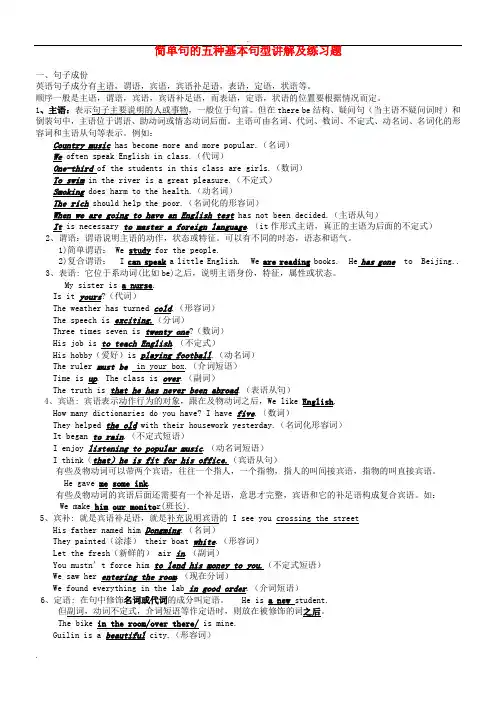
简单句的五种基本句型讲解及练习题一、句子成份英语句子成分有主语,谓语,宾语,宾语补足语,表语,定语,状语等。
顺序一般是主语,谓语,宾语,宾语补足语,而表语,定语,状语的位置要根据情况而定。
1、主语:表示句子主要说明的人或事物,一般位于句首。
但在there be结构、疑问句(当主语不疑问词时)和倒装句中,主语位于谓语、助动词或情态动词后面。
主语可由名词、代词、数词、不定式、动名词、名词化的形容词和主语从句等表示。
例如:Country music has become more and more popular.(名词)We often speak English in class.(代词)One-third of the students in this class are girls.(数词)To swim in the river is a great pleasure.(不定式)Smoking does harm to the health.(动名词)The rich should help the poor.(名词化的形容词)When we are going to have an English test has not been decided.(主语从句)It is necessary to master a foreign language.(it作形式主语,真正的主语为后面的不定式)2、谓语:谓语说明主语的动作,状态或特征。
可以有不同的时态,语态和语气。
1)简单谓语: We study for the people.2)复合谓语: I can speak a little English. We are reading books. He has gone to Beijing..3、表语: 它位于系动词(比如be)之后,说明主语身份,特征,属性或状态。
My sister is a nurse.Is it yours?(代词)The weather has turned cold.(形容词)The speech is exciting.(分词)Three times seven is twenty one?(数词)His job is to teach English.(不定式)His hobby(爱好)is playing football.(动名词)The ruler must be in your box.(介词短语)Time is up. The class is over.(副词)The truth is that he has never been abroad.(表语从句)4、宾语: 宾语表示动作行为的对象,跟在及物动词之后,We like English.How many dictionaries do you have? I have five.(数词)They helped the old with their housework yesterday.(名词化形容词)It began to rain.(不定式短语)I enjoy listening to popular music.(动名词短语)I think(that)he is fit for his office.(宾语从句)有些及物动词可以带两个宾语,往往一个指人,一个指物,指人的叫间接宾语,指物的叫直接宾语。
简单句的句型及种类 【真题再现】 1. __________ delicious these beef noodles are! (2014 临沂) A. What B. How C. What a D. How a 2. I don't think she will agree with us, ? (2014 安顺) A. will she B. won't she C. don't you D. do you 3. — ______ sweet music!(2014 咸宁) — And I really like the Voice of China TV programs. A. What B. What a C. How D. How a 4. — What are the rules at your school? (2014 黄冈) — Don’t run in the hallways and ______ arrive late for class. A. not to B. won’t C. don’t D. no 5. ________ weather it is today! (2014 十堰) A. What hot B. How hot C. What a hot D. How a hot 6. _______ wake up your sister, Ben. She needs a good sleep. (2014 重庆) A. Don't B. Doesn't C. Aren't D. Can't 7. _________ role she played in the movie! That's why she has a lot of fans. (2014 苏州) A. How interesting B. How an interesting C. What interesting D. What an interesting 8. We have to finish the work now, __________? (2015 呼和浩特) A. don’t we B. haven’t we C. have we D. do we 9. Look! _________ sweet smile the little girl has!(2015 青海) A. How B. What a C. What 10. ________ kind and helpful to the people around us, and we will make the world a nicer place to live in.(2015 河南) A. Be B. Being C. To be D. Been 11. on the grass, or it will “cry”. (2015 陕西) A. To walk B. Not to walk C. Walk D. Don’t walk 12. Please __________ your exam papers once again before handing them in. (2015 上海) A. going over B. went over C. go over D. to go over 【答案与解析】 1. B。本句句意为:多么美味的牛肉面!感叹句的结构是: What + (a/an)+adj.+ n.+主语+谓语+(it is);How + adj./ (adv.)+主语+谓语+ (it is)。 2. A。本句意为:我认为她不会同意我们的,不是吗?反意疑问句中,当陈述部分含有宾语从句,且主句的谓语动词是think, believe, expect, suppose等时,疑问部分与宾语从句相对应。I don't think...是否定前置,所以简短问句部分用肯定结构,故答案为A。 3. A。本句意为:——多美妙的音乐啊!——我真的很喜欢《中国好声音》这个节目。因为music是不可数名词,故前面不能用a表示,how + adj./adv.+主语+谓语+(it is);而 what + (a / an) + adj.+ n.故本题答案选A。 4. C。句意:――你们学校的校规是什么?――不要在走廊里跑,上课不能迟到。答语中是两个并列的祈使句,祈使句是以动词原形开头,否定形式是在其前面加don’t。根据句意和否定祈使句的结构,可知应该选择C项。 5. A。本题考查由what与how引导的感叹句的区别:这两个句型的基本格式为:How + adj./adv. +主语+谓语+其他部分!What + a/an + adj. + n. +主语+谓语+其他部分! 或 What + adj. + n. (复数名词或不可数名词) +主语+谓语+其他部分!故答案选A。 6. A。句意:不要叫醒你的妹妹,Ben. 她需要好好睡一觉。祈使句以动词原形开头,其否定形式为:Don't+动词原形,故答案为A项。 7. D。句意:她在这部电影中扮演的角色真有趣!那就是她有许多影迷的原因。感叹句的构成有两种:“How+形容词/副词+主语+谓语!”和“What (+a/an)+形容词+名词+主语+谓语!”,句中role为可数名词,根据以上提到的结构,应选D项。 8. A。句意为:我们现在必须完成工作,不是吗?反意疑问句遵守“前肯后否,前否后肯”原则;陈述部分的谓语动词是“have to”,为肯定句,故反问句部分用否定形式,故用don’t,故选A。 9. B。感叹句的基本结构有三种:“What a/an + adj. +可数名词单数+其他!”,“What + adj. +不可数名词/可数名词复数+其他!”,“How + adj./adv. +其他!”。句意为:瞧!这个小女孩笑得多甜啊! 空格处修饰可数名词单数smile,应用what a来引导。故选B。 10. A。句意:善良而且乐于帮助我们周围的人,我们将会让世界变得更美好。“祈使句+and+简单句”是一个常用句型。这里的祈使句相当于一个条件状语从句,后面的简单句相当于主句。祈使句通常以动词原形开头,故选A。 11. D。句意:不要践踏草坪,否则它将哭泣。祈使句以动词原形开头,否定形式在动词原形前加don’t。“祈使句+or+陈述句”,表示“……,否则,……”。根据句意,可知选D。 12. C。句意:请在上交考试卷之前,再次检查你的试卷。祈使句一般用动词原形开头,如果你的语气比较客气,或者出于礼貌,可以在动词原形前面加上please。go over检查。结合句意,可知是比较有礼貌的提醒,故答案为C项。 【用法讲解】 考试要求: 简单句的五种基本句型及There be句型是英语学习的基础和重点,也是中考试卷的重点,在书面表达、句子改写和翻译句子中都经常考查有关句子的知识;感叹句、疑问句、祈使句更是单项选择和句型转换的重点。 1.简单句的句型 简单句就是句子只有一个主语和谓语,有五种基本句型: (1)主语+谓语: 这种句型称为主谓结构(S+V),其谓语一般是不及物动词。例如: The rain stopped. 雨停了。 Things have changed now. 现在事情发生了变化。 (2) 主语+连系动词+表语: 这种句型称为主系表结构(S+L+P),连系动词在形式上也是一种谓语动词,表语一般是名词或者形容词。例如: His father is a teacher. 他的爸爸是老师。(表语是名词) Your mother is very young. 你的妈妈很年轻。(表语是形容词) (3) 主语+谓语+宾语: 这种句型称为主谓宾结构(S+V+O),其谓语动词是及物动词,宾语一般是直接宾语。例如: They often speak English at the meeting. 他们在会上经常说英语。 The house caught fire. 房子着火了。 (4) 主语+谓语+间接宾语+直接宾语: 这种句型称为主谓宾宾结构(S+V+O+O),其谓语动词必须是可以跟双宾语的动词,两个宾语中表示事物的是直接宾语,另一个表示人的是间接宾语。例如: My father gave me a pen last night. 昨天晚上我爸爸给我一支钢笔。 I will write you a letter when I get there. 我到那里儿时给你写信。 (5) 主语+谓语+宾语+宾语补足语: 这种句型称为主谓宾及宾补结构(S+V+O+C)其谓语动词必须是可以跟复合宾语的及物动词。例如: I find him very clever. 我发现他很聪明。 Your words make me angry. 你的话让我很生气。 2.句子的种类: 句子按照其用途可以分为四种:陈述句、疑问句、祈使句和感叹句。 (1) 陈述句: 用来陈述一件事情或者某种事实、观点的句子。陈述句可以分为肯定句和否定句两种形式。例如: They often go to school on foot.(肯定句) 他们通常步行去上学。 My father doesn’t watch TV at home after supper.(否定句) 我爸爸晚饭后在家不看电视。 (2) 疑问句: 用来提出疑问的句子。可以分为:一般疑问句、特殊疑问句、选择疑问句和反意疑问句四种类型。 1) 一般疑问句: 能够用Yes或者No来回答的疑问句叫一般疑问句。肯定回答用Yes,否定回答用No。 一般疑问句的结构是:Be+主语+表语+……?或者是:助动词/情态动词 +主语+谓语+ ……?例如: -Are you a teacher? 你是老师吗? -Yes, I am. 是的,我是。 或:-No, I am not. 不,我不是。 —Does your mother go shopping on Sunday? 你妈妈星期天购物吗? -Yes, she does. 是的,她经常去购物。 或:-No, she doesn’t.不,她不经常去购物。 —Must we go at once? 我们必须立刻走吗? —Yes, we must. 是的,必须走。 或:—No, we needn’t. 不,没有必要。 注意: 一般疑问句也可用表示肯定或否定的词来回答,如certainly(当然), surely(当然), of course(当然),I think so(我想是的),all right(好吧),certainly not(当然不是), not at all(一点也不), never(从不),sorry(很抱歉),not yet(还没有) I’m afraid not(恐怕不是)等。 2) 特殊疑问句: 用来对句子的某一特殊部分提问的句子叫特殊疑问句。特殊疑问句一般用降调。其结构是:特殊疑问词+一般疑问句(+……)?对它的回答不能用Yes或者No,要根据询问的内容具体回答。例如: -Where were you at that time? 那时你在哪里? —I was at home. 我在家。 常用的疑问代词有who(谁),whom(谁),whose(谁的),which(哪一个),what(什 么); 疑问副词有when(何时),where(何地),why(为什么),how(如何)以及“how+